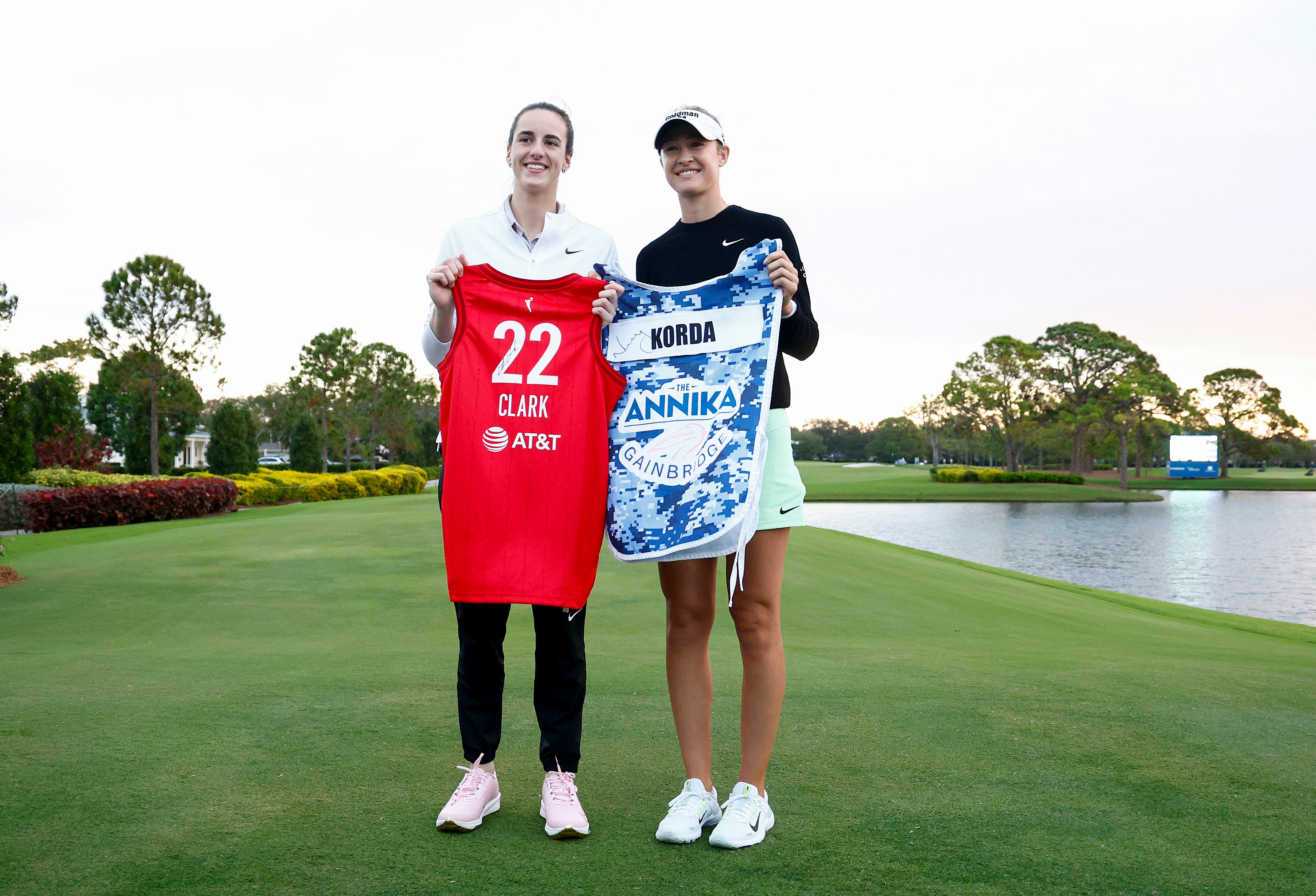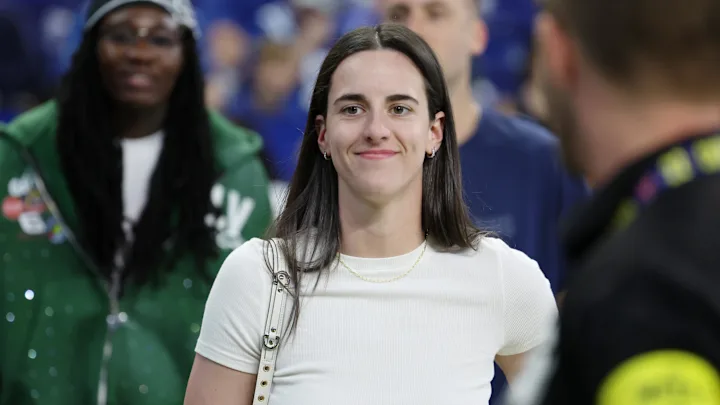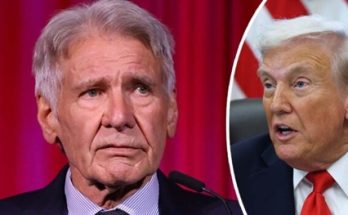In what was meant to be a quiet offseason activity, Caitlin Clark’s appearance at an LPGA pro-am event has exploded into a full-blown referendum on her own league, delivering a stunning and humiliating rebuke to the WNBA. The entire golf community, from its biggest legends to its current stars and its media partners, just delivered a masterclass in how to treat a generational talent—a lesson that has left the WNBA looking petty, jealous, and startlingly incompetent.
When Clark, a recreational golfer, set foot on the course, the “Caitlin Clark effect” was on full display. But this time, the reaction was not one of frigid jealousy or bitter resentment, as has allegedly characterized her WNBA rookie season. Instead, she was met with what the WNBA has seemingly refused to give her: sincere appreciation, profound respect, and enthusiastic celebration.
The difference in reception was immediate and palpable. Nelly Korda, one of the planet’s elite women golfers, didn’t just endure Clark’s presence; she celebrated it. Korda, who spent time with Clark, was glowing in her praise, noting the incredible influence Clark has on sports and how “cool” it was to see her effect firsthand. It was a warm, welcoming gesture—a stark contrast to the “frigid, jealousy-tinged response” Clark has reportedly faced from WNBA players who can’t cope with the spotlight she naturally attracts.
But the praise didn’t stop there. It came from all corners of the sports world, creating a blueprint for how a superstar deserves to be honored. Maria Fassi, a skilled golfer from Mexico, was brimming with genuine gratitude, stating what Clark is “doing for sports” is “kicking ass.” Fassi’s reaction highlighted a simple truth: when women raise each other up, success is shared. This, the video’s narrator points out, is a foreign concept to the “woke and jealous WNBA players” who have let envy cloud their judgment.
Even basketball’s own royalty, Steph Curry, who also participated in a celebrity golf event, chimed in with immediate praise for Clark’s multi-sport talent and her power to mesmerize viewers, whether on the hardwood or the fairway.
Perhaps the most potent validation came from the sport’s ultimate icon: Tiger Woods. The golf legend, famous for being careful with his praise, was “deeply impressed.” Woods spoke frankly about Clark’s “great swing,” her “potential,” and her incredible ability to bring excitement to any sport she touches. He was reportedly in “awe,” even hoping to get a basketball signed for his daughters. When one of the greatest athletes of all time recognizes your impact, it speaks volumes.
This wave of adulation from the titans of golf and basketball only serves to highlight the WNBA’s disgraceful failure. Instead of nurturing its “most luminous star,” the league has “let jealousy and small-mindedness block its path.”
The humiliation for the WNBA extends far beyond the players; it exposes a catastrophic marketing failure. The Golf Channel and the LPGA saw the “Caitlin Clark effect” for what it was: a golden opportunity. The pro-am event, originally, “wasn’t even going to be televised.” But then, the fans—the same massive fanbase the WNBA seems to hold in contempt—sprung into action. They flooded the organization with emails and calls, demanding to know, “How can we watch Caitlin?”
The LPGA, unlike the WNBA, listened. In a brilliant and nimble marketing move, the Golf Channel “went on air 90 minutes early to broadcast clips of her.” They recognized the moment and seized it. Social media exploded. The LPGA leaned in, building hype and leveraging Clark’s fame to pull in a massive new audience, enhancing the visibility of their entire sport.
This, as TV host Rachel Deita pointed out, is precisely what the WNBA has failed to do. The WNBA, Deita argued, has devalued Clark, preferring to “try and balance her fame with that of her competitors” in a misguided attempt to placate egos. This hesitance to promote its premier athlete has been a “huge squandered chance.” The LPGA, in a single day, demonstrated more marketing savvy than the WNBA has all season. They saw a “once-in-a-generation talent” and, rather than trying to diminish her, they built a festival around her.
This contrast revealed the ugly truth: the WNBA appears “more worried about keeping the peace among its players” than it is about the monumental growth of the league. It let “internal drama” and petty jealousy guide its reaction, diminishing Clark’s impact and capping its own potential.
Throughout the entire LPGA event, a striking narrative emerged. As one analyst noted, “I didn’t hear one thing about how her fans are toxic. I didn’t hear one thing about there being too much spotlight on Caitlin Clark.” All the negative, divisive narratives that have plagued the WNBA season were completely absent. There was only positivity, respect, and celebration.
The event’s own host, golfing icon Annika Sörenstam, personally thanked Clark for attending, acknowledging her packed schedule and showing gratitude for her presence. It was another powerful validation, a model of “what real support in women’s sports should be.”
Caitlin Clark is a game-changing talent with the power to “reshape women’s basketball for the next generation.” But, as this golf event so clearly proved, that can only happen if she is supported, honored, and given the stage she has earned. The LPGA, Korda, Fassi, Curry, Woods, and Sörenstam have all shown the WNBA the “exact blueprint” for how to do it. They welcomed talent and honored greatness.

The WNBA is now at a critical juncture. It has been publicly embarrassed by a rival league’s simple act of professional respect. It can either maintain its present course, suffocating its biggest star with jealousy and short-sightedness, or it can heed this “alarm bell.” It must step up, move past the petty infighting, and fully support Clark for the incredible athlete and representative that she is. The LPGA has proven that when you embrace your stars, the entire sport flourishes. The WNBA must now decide if it wants to be a part of that rise or be remembered as the league that tried to dim its own brightest light.



